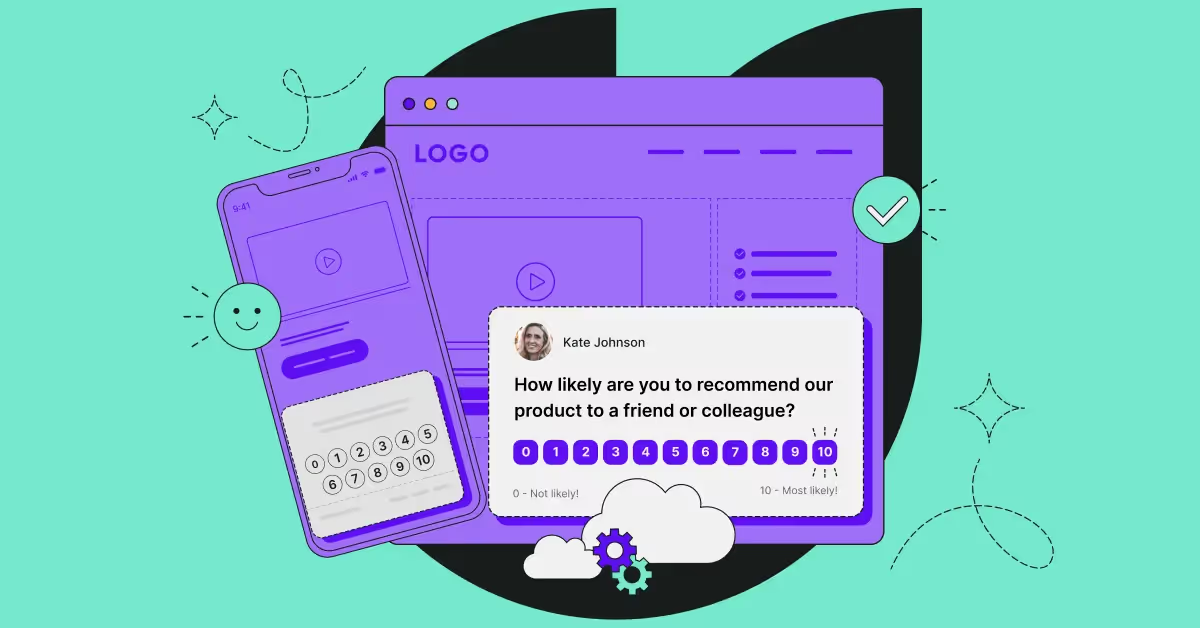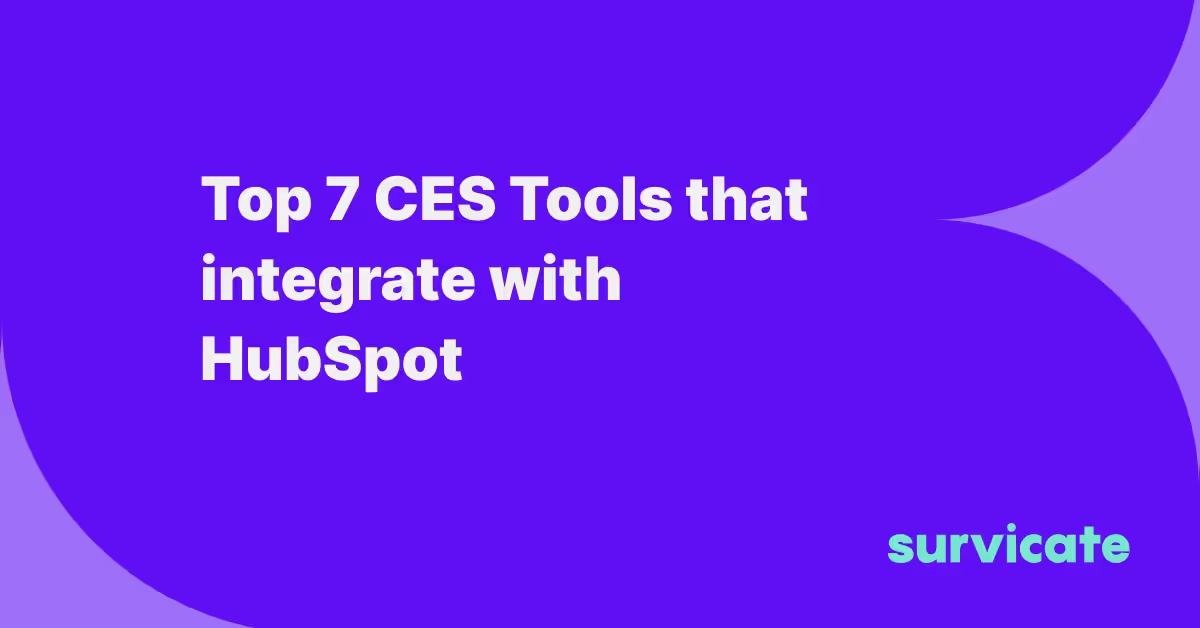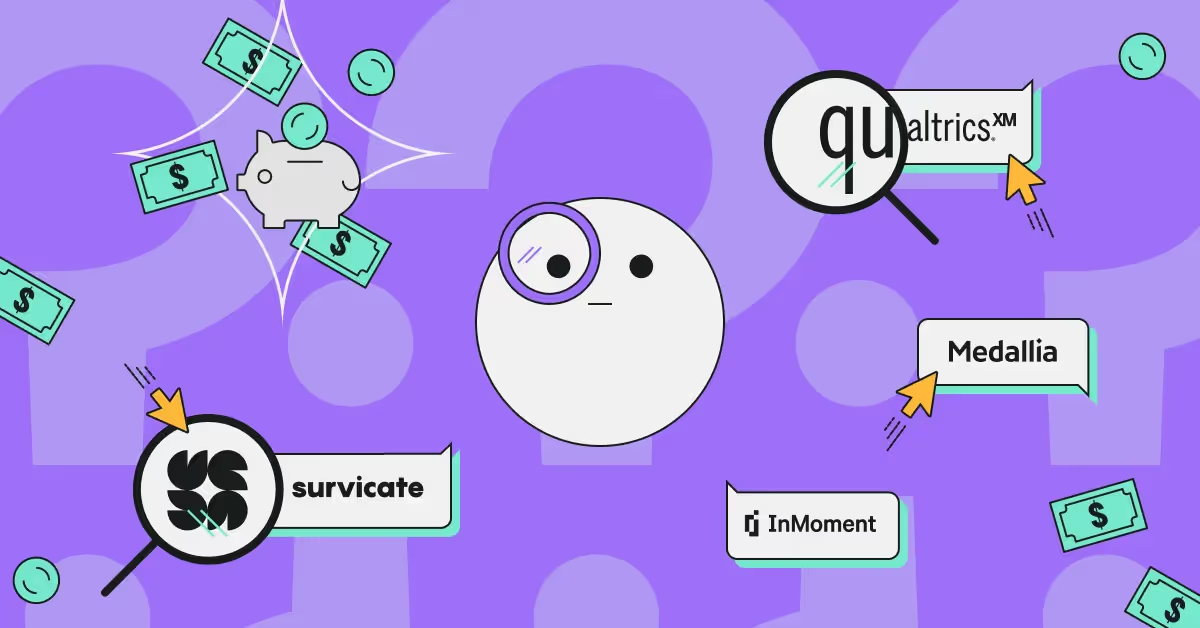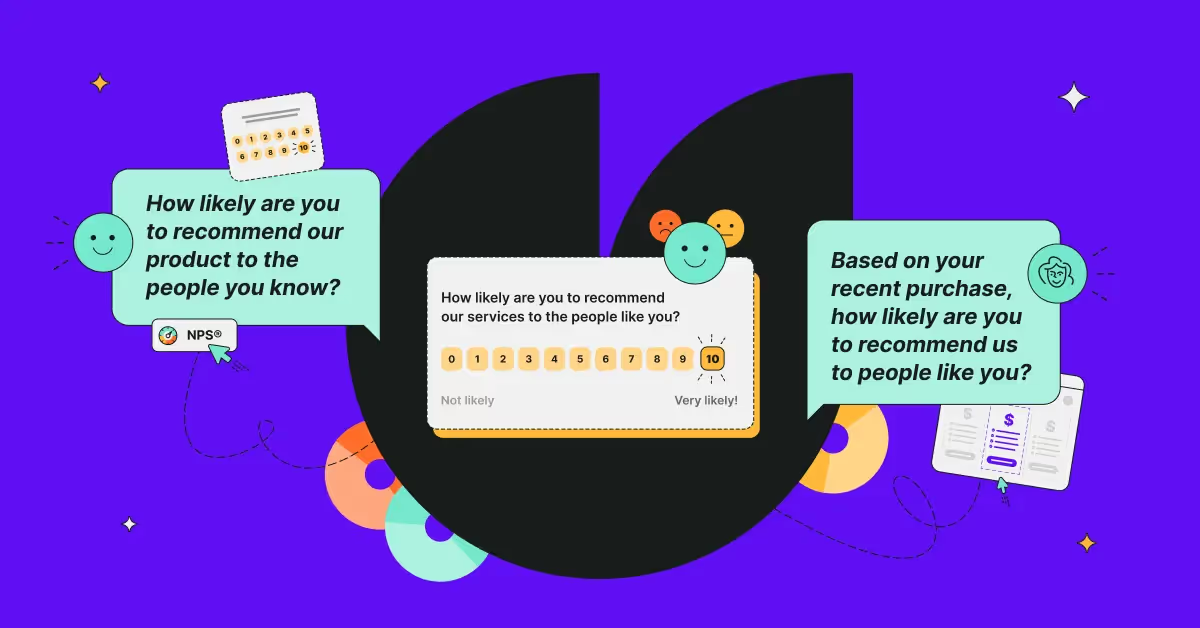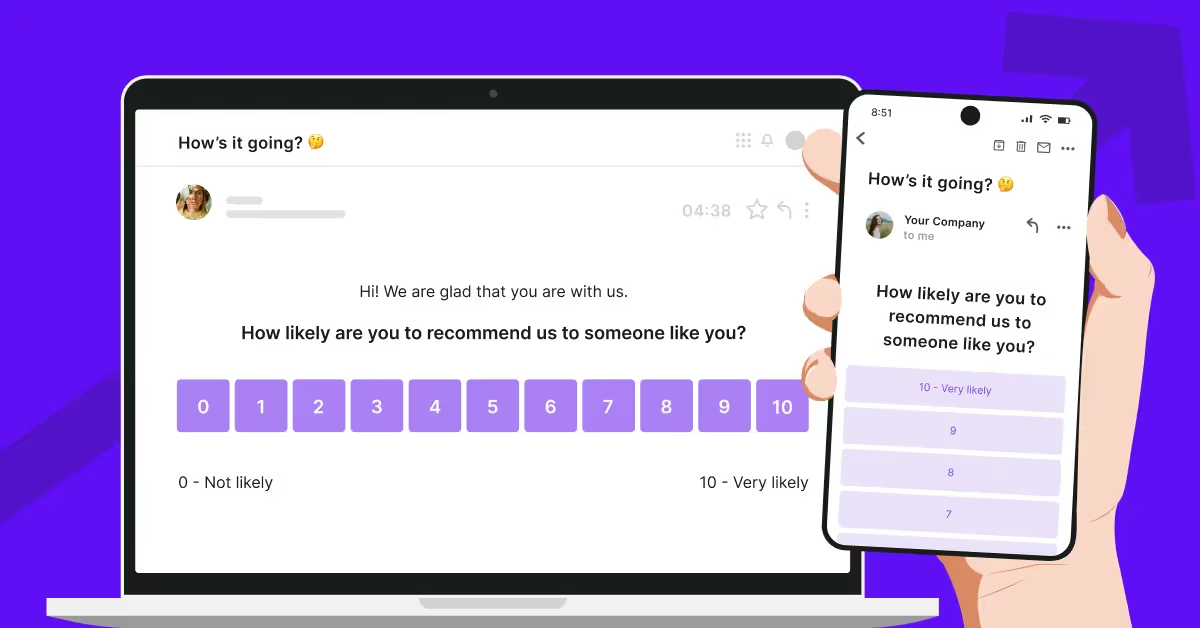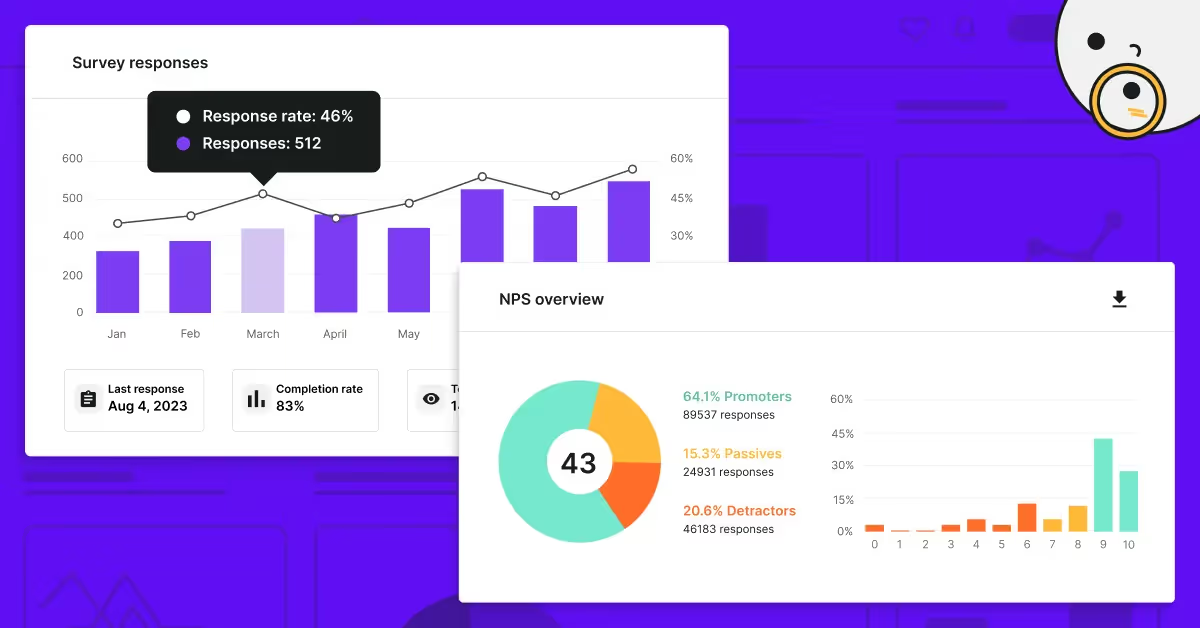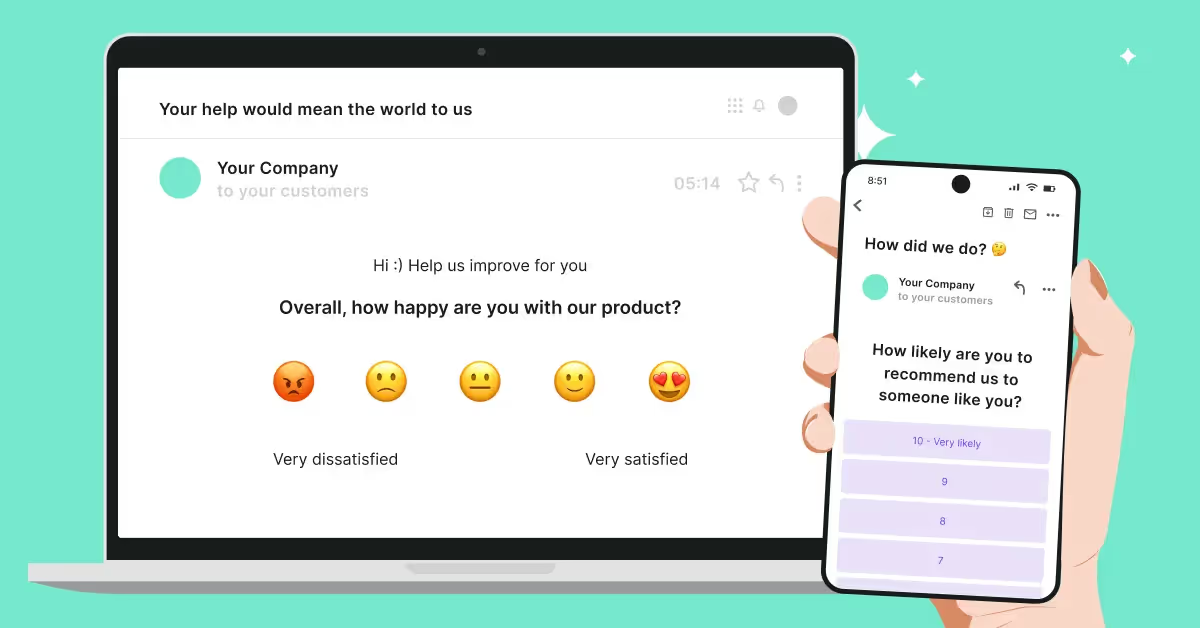Events – online or offline – are a huge investment for any business. Not only do you have to invest time and money into putting on the event, but you also have to hope that it will bring the desired results that will justify the cost. That's why gathering feedback from your attendees after the event is over is important, and make sure you act on that feedback afterward.
Today, we're going to look at the dozen of the most important questions you should be asking in your event feedback surveys. Covering all of these bases and you'll be getting the most actionable feedback possible from your attendees to improve your events going forward.
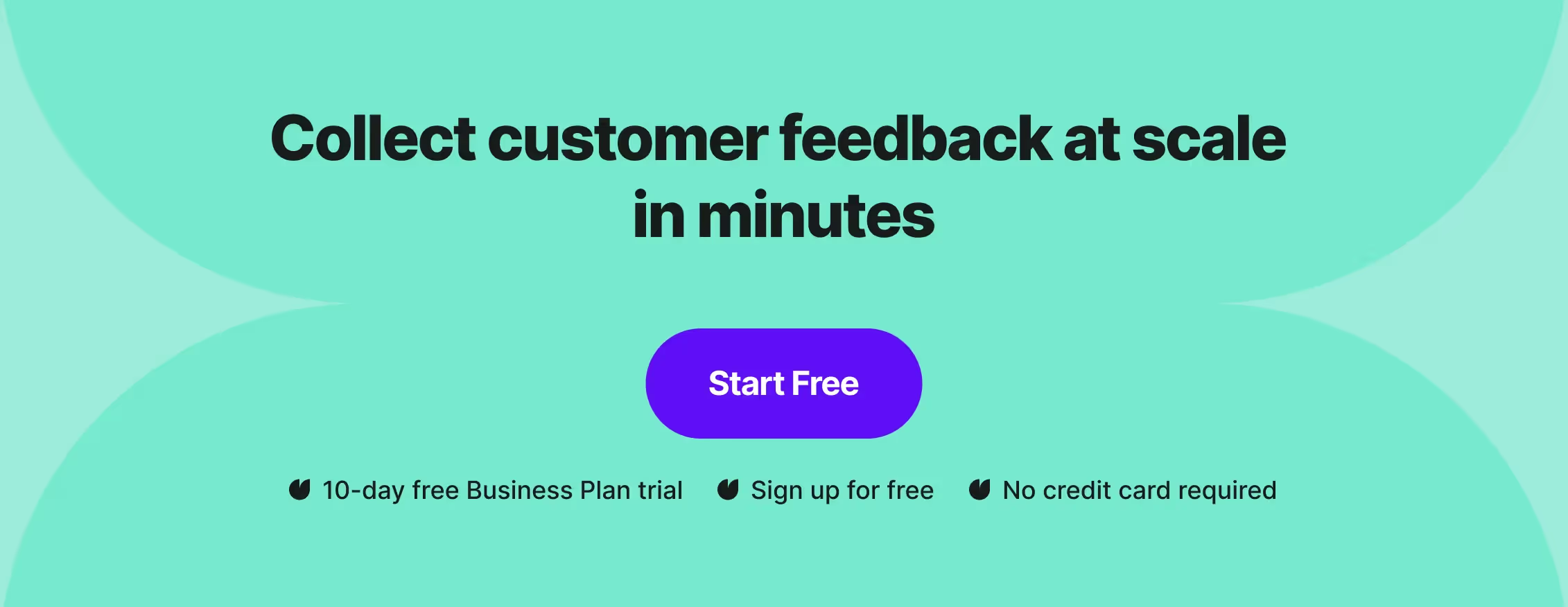
Why Should You Run An Event Feedback Survey
Get feedback from your attendees to improve future events
It was all supposed to go so well. You spent weeks, maybe even months, planning your event. You carefully selected the venue, negotiated group rates, created an amazing schedule of activities, and put together goodie bags that would make any attendee swoon. But something just didn’t feel right when it was all said and done.
You can't put your finger on it, but you know that something could have been better. If only you had known what your attendees were thinking, you could have made the necessary changes to ensure everyone had a good time...
That's exactly what you can and should, do with event feedback surveys. They are not to be sent and forgotten – event feedback surveys are an important tool that can help you improve your events and ensure that each subsequent event is better than the last.
Gauge the effectiveness of your event marketing and promotion
Numbers don't lie – but they also don't tell the whole story. You can see from your event registrations how many people signed up for your event, and you might even have a good idea of how many attended.
But were those attendees your target market?
Have they attended, and enjoyed, the actual event?
You spent your time and resources promoting your event to a certain audience – but without customer feedback, you won't be able to tell if your marketing efforts were successful. Post-event surveys can help you understand which channels were most effective in getting the word out about your event, and whether or not your attendees felt like your marketing was targeted toward them. All of that gives you a lot of info on how to allocate your marketing budget.
Learn what worked and what didn't from the perspective of your attendees
What you think and what your event attendees think is often very different. Just because you thought your event ran smoothly, doesn't mean that your attendees would agree. And even if there were some hiccups along the way, your attendees might not have noticed – or worse, they might not have been affected by them.
The only way to get an accurate picture of how your attendees experienced your event is to ask them directly. Meeting feedback surveys can help you learn about the different aspects of your event, from the venue to the activities, and see which ones worked well and which could have been improved. While positive feedback is nice, negative feedback can help you the most.
Identify opportunities to increase attendance or improve the overall experience.
With events, the truth is – you can always do better. No matter how perfect your event might seem, there’s always room for improvement. Especially if the number of registrants and the number of attendees is different or lower than you had hoped.
By understanding what your attendees did and didn't like about your event, you can make the necessary changes to ensure that more people sign up and attend your next event. And even if attendance is good, you can still use feedback to improve the overall experience for your audience.
Event Survey Feedback Questions
Promotion-related Survey Questions
A single question about your event's promotion can give you some valuable insights. For example, consider asking attendees how they heard about your event. This will help you understand which channels are most effective in reaching your target market.
You could also ask about the relevance of your event marketing and whether or not it was targeted toward the attendee's interests. This will help you understand whether or not your marketing efforts are on the right track.
Finally, you could ask if the attendee would have registered for the event if they had known more about it. This will help you understand what potential information attendees are looking for and whether your event description effectively communicates your event’s value.
Examples of promotion-related survey questions
- How did you hear about the event?
- Was the event marketing relevant to your interests?
- Would you have registered for the event if you had known more about it? (To those who didn't sign up but are, e.g., on your newsletter mailing list)
- Why did you decide to attend the event?
- Was the event promoted effectively? Why or why not?
- What channels were most effective in getting the word out about the event (e.g., social media, email, website, etc.)?
- Was the event marketing targeted toward your specific interests? Why or why not?
- How much did you know about the event before you attended?
- What could have been done to promote the event in the most effective way to people like you?
- Which marketing platforms are you most responsive to? (for future reference)
💡 Sky is the limit when it comes to expanding your surveys. You can gather a lot of constructive feedback and qualitative data via content rating surveys, and then hop on an open-ended question to ask your event attendees.
Activities and Agenda Survey Questions
Your attendees will have different opinions on every single activity and speaker at your event. And while it's impossible to please everyone, it is possible to get a general idea of what worked and what didn't.
Here's where NPS surveys will work wonders. Ask attendees to rate each activity on a scale of 1-5, with five being the best. You could also ask attendees to leave comments about specific actions or speakers to get more detailed feedback. Then you can leave some open-ended questions too.
Examples of activities and agenda survey questions
- How did you feel about the overall event schedule? Was it too packed, or were there too many lulls?
- How did you feel about the mix of activities (e.g., breakout sessions, keynote speeches, networking opportunities, etc.)?
- Did any activities stand out to you as being particularly good or bad? Why?
- Were there any speakers or presenters you particularly enjoyed or didn't enjoy? Why
- What topics would you like to see covered at future events?
- What activities would you like to see more of (or less of) at future events?
- Were there any activities you felt were unnecessary or didn’t add value?
- Did the event flow smoothly, or were there any hiccups that disrupted things?
- What could be done to make the event more enjoyable for event attendees?
- How can we build the agenda for future conferences so that you're getting the most value out of them?
💡 Sending a targeted post-event survey can help you gather data to improve your agenda for future events and attract better event sponsors or bring repeat attendees.
Networking Event Survey Questions
No matter what kind of event you're hosting, networking options are always a big draw. And as an event planner, it's your job to ensure those opportunities are valuable for attendees. To gauge the success of your networking efforts, ask post-event survey questions that will help you build a better networking experience and improve attendee satisfaction.
Examples of networking event survey questions
- Did you have any meaningful conversations with other attendees? Why or why not?
- Do you feel like you made any valuable connections at the event? Why or why not?
- What could have been done to make the networking opportunities more valuable for you?
- Did you attend the networking events? If not, why not?
- If you could change one thing about the networking options at the event, what would it be?
- What was your favorite networking opportunity at the event? Why?
- How should we plan networking areas for next year's event?
- On a scale from 1 to 10, how likely are you to network at future events we host?
- Did our event meet your expectations when it comes to networking?
- What is your favorite networking memory from the event?
💡 Networking is often "make or break" for your target audience. Make sure you’re doing everything possible by surveying attendees and using their feedback to improve your corporate events. If the actual attendees don't feel like they had a chance to network, they're unlikely to come back.
Location and Venue Survey Questions
The location and venue of your event can make or break the experience for attendees. After all, if they're uncomfortable or unhappy with their surroundings, it's going to reflect poorly on your event as a whole. That's why it's so important to get feedback via post-event survey questions on the venue and location, so you can make improvements for future events.
Examples of location and venue survey questions
- Did you like the location of the event? Why or why not?
- Where did you hear about this event?
- Was the venue too big or too small for the event? Did you find the venue to be comfortable? Why or why not?
- Were there enough (or too many) food and drink options?
- How would you rate the venue on a scale from 1 to 10?
- What did you think of the event space?
- Was the event space used effectively? If not, what could have been done differently?
- Were the sponsorship packages valuable for you?
- How can we improve the venue for future events?
- How can we improve the venue for attendees with special needs or requirements?
💡 Your survey takers can be your best asset in finding a new venue for your event. If they didn't like the location or the venue, make sure to ask why so you can take their feedback into account when looking for a new space and boost overall satisfaction.
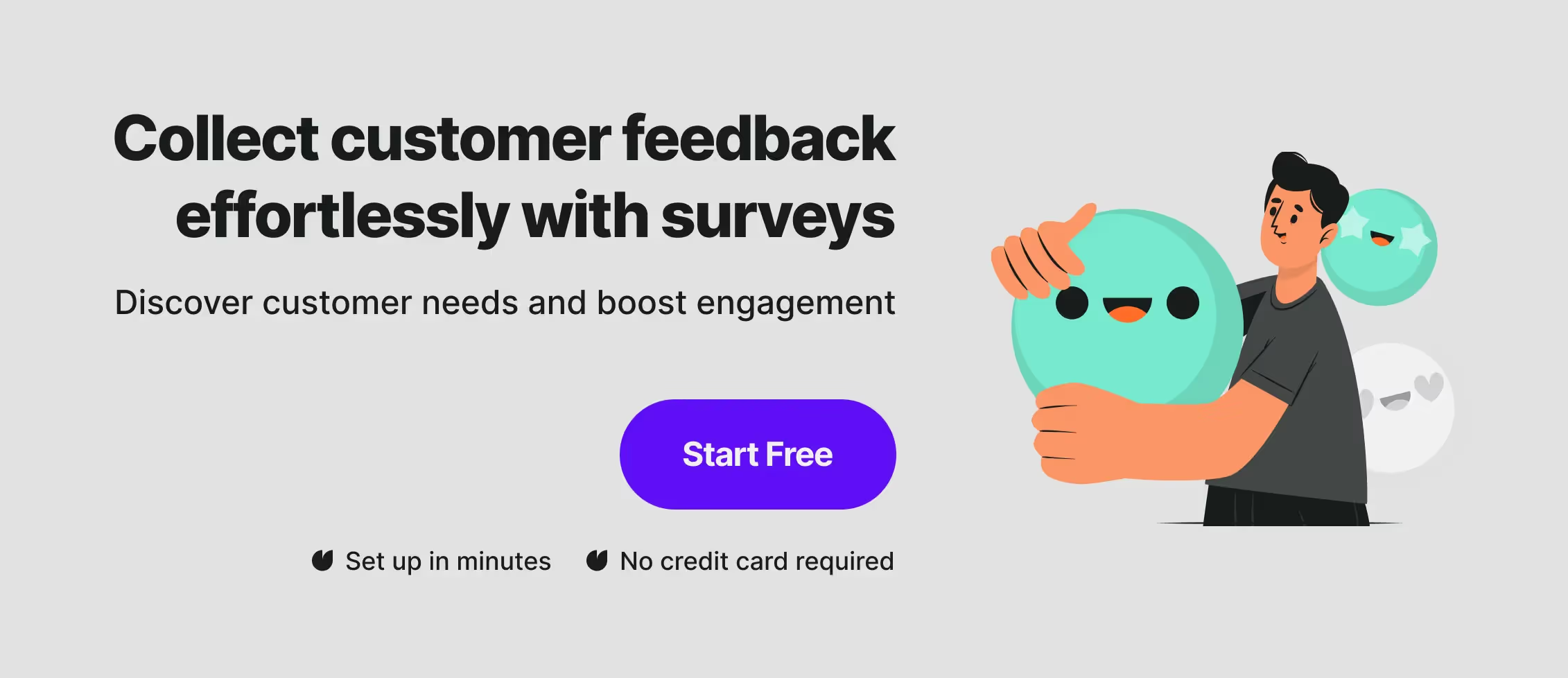
Pre-event Survey Questions
Who said that surveys have to happen post-event? Asking attendees questions before the event can help you better understand their needs and expectations. That way, you can ensure those needs are met when the event happens.
Examples of pre-event survey questions
- What are you most looking forward to at the event?
- What are your expectations for the event?
- What topics or speakers would you like to see at the event?
- What specifically would you like to learn or accomplish by attending the event?
- What kind of meaningful connections are you hoping to find at the event?
- Are there specific vendors or exhibitors you want to see at the event?
- Do you have any dietary restrictions or allergies that we need to be aware of?
- Do you have any special needs or requirements we need to accommodate?
- Are you comfortable attending an event held in (city/country)?
- On a scale from 1 to 10, how likely are you to attend the event?
💡 Rating scale questions can be helpful to get a general idea of how your attendees are feeling, but follow up with open-ended questions or multiple choice questions so you can get more specific feedback and in-depth insight to measure success and apply changes.
Event Survey Questions During The Event
Asking questions on the go might be challenging, especially at a large-scale event, but it's one of the best ways to get honest feedback. After all, attendees are more likely to be candid when they're in the moment and can tell you exactly how they feel.
Examples of event survey questions
- What did you think of the opening keynote?
- Was there anything you didn't like about the opening keynote?
- What did you think of the (breakout session/workshop/panel discussion) you attended?
- Do you find networking opportunities to be valuable? Why or why not?
- Why did you decide to attend this event?
- How would you rate the event on a scale from 1 to 10?
- What has been your favorite part of the event so far?
- Do you have any suggestions on how we can improve the event?
- Can we make your experience better?
- Is the event living up to your expectations? Why or why not?
💡 You can send such surveys embedded in a quick email, as an in-app notification if you run an event app, or in person during an offline event. Create one with Survicate in seconds:
Post-event Survey Question
Once the dust has settled, and the event is over, it's time to reflect on what went well and what could have been improved. That's where post-event surveys come in. These surveys should be sent out as soon as possible after the event while everything is still fresh in attendees' minds.
Examples of post-event survey questions
- How would you rate the event on a scale from 1 to 10?
- What did you think of the overall event experience?
- Was the event well-organized? Why or why not?
- Did you have any issues with registration or check-in?
- What did you think of the venue?
- Was the event space used effectively? If not, what could have been done differently?
- What are your thoughts on the food and drink options?
- Was there anything you didn't like about the event?
- Would you recommend this event to a friend or colleague?
- Was the event worth the price of admission?
💡 You can fully capture attendee experience with Net Promoter Score (NPS) survey questions. And you were measuring attendee satisfaction after the event allows you to track your progress over time and see if you're improving.
Offline Event Survey Questions
With offline events, chances are that you'll have more time to interact with your attendees and get their feedback in person. But even then, it can be helpful to send out a survey afterward to capture everything said.
Examples of offline event survey questions
- What did you think of the event in general?
- Did you enjoy the venue?
- What did you think of food catering?
- Do you have any suggestions on how we can improve the event so you can attend future events too?
- Can we make your experience better?
- Will you take part in the next edition of the event?
- What are your thoughts on the speakers?
- Did you find the speeches/talks interesting?
- Do you have any suggestions on who we could invite as a speaker for the event’s next edition?
- What did you think of the exhibition area?
💡 A good starting point for offline event survey questions is to ask about the overall event experience and then drill down into specifics. For example, suppose you’re surveying after a conference. In that case, you might want to ask about the quality of the speeches, the usefulness of the exhibition area, and whether attendees would recommend the event to others.
Online Event Survey Questions
Online conferences have their own set of challenges, and you'll need to adjust your virtual event feedback questions accordingly.
Examples of online event survey questions
- Did you like the online platform we used?
- Was the conference easy to navigate?
- Did you have any technical issues?
- What did you think of the quality of the live stream?
- Do you prefer offline or virtual events? Why?
- How can it be streamlined further to enhance the user experience?
- Did you miss any important aspects by not being there in person?
- Do you have suggestions on how we can make the event more interactive for attendees?
- What did you think of online networking with event attendees?
- Did you meet any interesting people?
💡 With rating scale questions here, it can be helpful to use a 1-10 scale so that attendees can give more specific feedback. For example, you might ask attendees to rate the quality of the live stream on a scale from 1 to 10 – and then roll open-ended follow-up questions so that you can understand why they gave that particular rating in their own words.
Hybrid Event Survey Questions
Have you just hosted a hybrid event? Then you'll want to know what your attendees thought of both the online and offline components.
Examples of hybrid event survey questions
- Which part of the event did you enjoy more? The online or offline component?
- Was the registration process intuitive and user-friendly?
- Do you feel you’re missing out on hybrid events by not being there in person?
- Do you have suggestions on how we can make it more interactive for attendees?
- What did you think of the networking opportunities?
- Is this mixed format something you would like to see more of in the future?
- Would you attend fully virtual events?
- Did the event meet your expectations?
- Which event format do you prefer for the next event?
- Do you have suggestions on how we can improve the hybrid event experience?
💡 Collect feedback on your hybrid event’s online and offline components. E.g., if training sessions took place on your virtual platform, you'd want to know what attendees thought of those too – but You should also include the offline part in your attendee feedback.
Post Event Surveys: Best Practices Checklist
- When it comes to a post-event survey, timing is everything. You want to ensure that you give your attendees enough time to process their experience, but you want to make sure they've remembered all about the event.
- Send out post-event surveys as soon after the event as possible. This will ensure that your attendees' memories are fresh and that they'll be more likely to respond to the post-event survey.
- Make sure the survey is short and to the point. No one wants to spend hours filling out a long survey, so keep each event survey question concise and easy to understand.
- Incentivize your attendees to fill out the survey by offering them a chance to win a prize. This will help increase the response rate of your post-event survey and ensure that you're getting feedback from as many people as possible.
- Make the post-event survey accessible to everyone. If you're sending out an online survey, ensure you can complete it on all devices (desktop, laptop, tablet, phone). Surveys made with Survicate are spot on, offering a fully responsive design no matter the device.
- Create event surveys that are easy to understand and follow. Avoid using jargon or technical terms that your attendees might need to be more familiar with.
- Ensure the survey is anonymous. This method helps ensure that your attendees are honest in their feedback and avoid bias in post-event survey questions.
- Summarize the results of the survey and share them with your team. This will help you identify areas that need improvement and make necessary changes for future events. (Reporting in Survicate is extremely intuitive so that you can semi-automate this mundane task).
- Use event survey tools. It's important to use event survey platforms to automate the process and make it easier for you to collect, analyze, and act on feedback. Survicate is one of the leading event survey solutions on the market.
- Leverage different types of surveys. Usually, event organizers send only post-event surveys to know how to improve future events. You can also send pre-event surveys with multiple-choice follow-up questions to learn more about your attendees and what they expect from the event. You can pop a quick event survey or pre-event question via the NPS survey. This type of survey can help you fine-tune your planning for events.
Conclusion
You can get valuable feedback to improve your upcoming event with the right survey questions. Whether it's a physical or virtual event, use surveys as one of your main tools to get insights from attendees.
Surveys are a powerful way to collect feedback from your attendees – and even with single post-event surveys or a set of rating scale questions, you can nail your next event on the spot.
Survicate is happy to accompany you on that journey – with the above list of survey questions to ask and in executing event surveys in practice. Build a beautiful pre-event survey or post-event survey and enhance the experience you deliver. Sign up for your 10-day free trial now!








